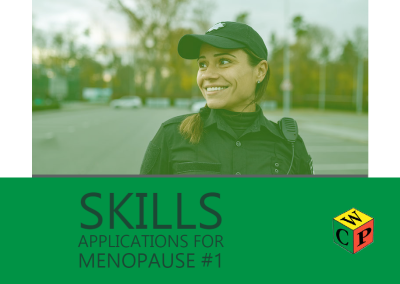By now you have likely noticed that none of the coping skills blogs specifically mention menopause. If this causes you to tilt your head to the side like Nipper, the old RCA dog, allow me to explain. The most valuable and effective coping skills are those that can be applied across a wide spectrum of life’s issues. You, as a MM reader, are getting in on the ground floor since the skills I offer on the Menopausal Militia website are part of a larger, developing training and book project – Skills Beyond Pills © – the goal of which is to aid people in managing life’s challenges while reducing their reliance on pharmaceutical interventions.
We have become a society quick to turn to meds to ease our unpleasant moods and symptoms without always putting much effort into doing so ourselves. We are quick to call a cluster of feelings or sensations a “disease” when in reality it is often dis-ease, meaning a lack of comfort either emotional, physical or both. I am not anti-medication but if you can avoid it, delay it, reduce it or even assist it by employing some relatively simple coping skills why not give that a try?
Since you are here you are, at best, interested in and, at worst, suffering from challenges related to the menopausal timeline. If you find yourself on the runaway menopausal train your emotional tank may be empty. Pulling from the Web MD article “The Emotional Rollercoaster of Menopause” the top nine emotional issues during menopause are:
- Irritability
- Feelings of sadness
- Lack of motivation
- Anxiety
- Aggressiveness
- Difficulty concentrating
- Fatigue
- Mood changes
- Tension
Not exactly a recipe for clarity of thought or motivation for change. These are much more likely to produce a sense of exhaustion, hopelessness and a desire to choke household members who will not put their shoes where they belong, hang up wet towels or at least rinse off their dirty dishes before leaving them in the sink overnight.
If you are just beginning to assess your individual mix of the above emotional issues, then self-assessment is a gentle starting place. Possum Philosophy shows that psychobabble is not helpful when someone is stressed and emotional, yet we do need to take an honest inventory of ourselves and how we might be participating in our own distress. For example, if you find yourself red faced and gesturing wildly night after night after night, imploring your loved ones to at least act like they care – all to no avail – then you are just repeatedly running over that poor flat possum. It might be time to examine the situation for unrealistic expectations. I understand that asking someone to pick up their shoes is not unrealistic. What IS unrealistic is asking repeatedly for something to be done without attaching any consequences to their failure to do so. Calmly and lovingly inform your people that, until they can meet you in the middle of the family responsibility continuum, you are not especially inclined to prepare their meals, do their laundry or be their taxi driver. Be sure to choose consequences that you will follow through on, otherwise, idle threats are just more trips across the flat possum. One of two things will happen. They will either begin to take some responsibility and help out OR you will have some free time to read, do yoga, catch up with friends and take a bubble bath. Win-win don’t you think?
Start With Simple and Easy is all about not adding any more stress to your life if you are already dealing with the symptoms of tension, irritability, difficulty concentrating or lack of motivation. If the goal is to add some coping skills to your life you certainly don’t want those skills to be frustratingly difficult. It doesn’t qualify as coping if it makes everything worse. There may be times where you want to apply this concept to ALL THE THINGS, not just to coping skills. If you hit a really rough patch, it may serve you well to ask “is this simple to understand and easy to do?” about everything. And if it’s not then give yourself permission to say no or back burner it until you’re in a better space. One of my favorite sayings is “you are not required to set yourself on fire to keep other people warm” (that will be a future blog for sure).
Existing-Living-Thriving gives step by step guidance about 1) being tuned in to how you feel and how you are interpreting your current life experiences and 2) how to know when it’s time to say no and do some self-care before you bottom out. When you are engulfed in the emotionally difficult symptoms of menopause it is hard to see it as a time-limited life stage that is transitioning you towards a freer and more empowered period of your lifetime. Some days, weeks, months it can seem as though you rarely lift out of Existing mode. Start tracking where you are on a daily basis and you will be able to move yourself into that upper Living-Thriving-Living loop or at least identify what’s getting in the way.
In Gentle Self-Assessment the tricky part is that you could have been consistently living in Chapter IV or even V prior to entering menopause and yet now you often feel as though you are wallowing back in Chapter I or II. I know. It sucks. But it will be OK. Step one is to give yourself some grace and compassion. And then, on a good day, take a look at just one issue and ask yourself what chapter that one is in. Sit with that assessment for a bit and see if it feels honest and accurate. Then take a look at the next chapter and ask yourself, “What does the path forward look like?”. “How do I get from where I am just to the next chapter with this one issue?” Take your time, be gentle with yourself, ask for help if you need it and move slowly. But move. Progress always requires movement. The ability to see where you are and to step around that hole, or to walk down a different street altogether requires focus, concentration, motivation and a sense of self-worth. Not always plentiful during the height of menopausal mayhem but you CAN do it. Menopausal Militia is here to guide you every step of the way.

